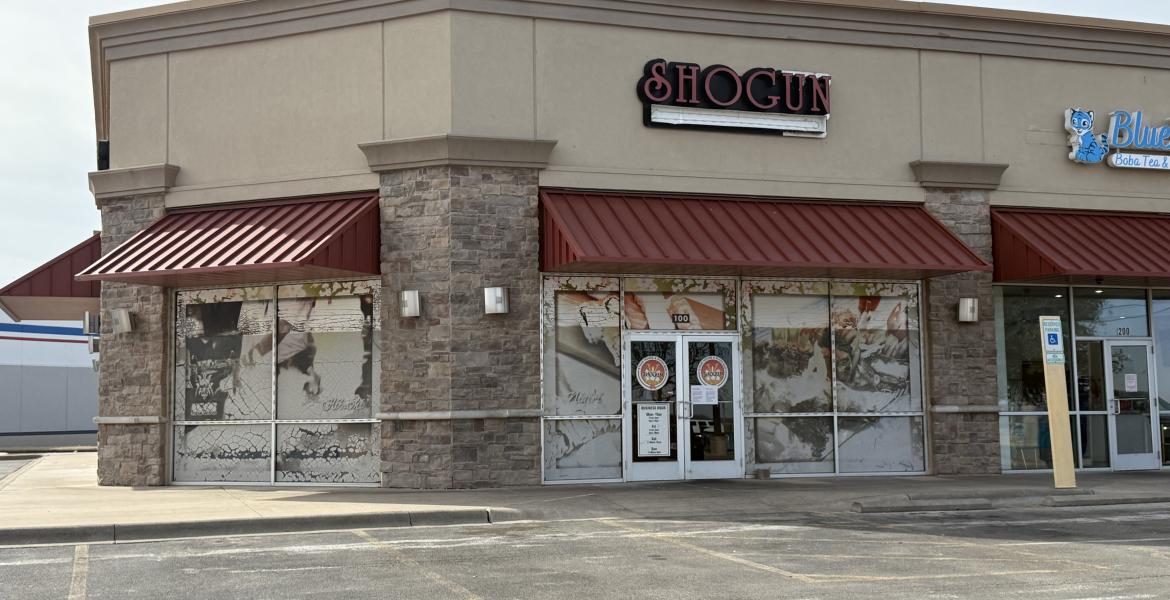San Angelo businesses received their notices and new trash invoices indicating that the commercial trash rates have increased significantly this month, and they don’t like it.
Chicken Express franchise owner Travis Montgomery faxed LIVE! a copy of his trash bills, and his dumpster invoice from Republic Services increased 73 percent at the North Bryant store. At the newer Chicken Express location on Southwest Blvd., his Republic invoice increased by 92 percent.
“How many jobs do they want me to eliminate to pay for their new trash rates,” Montgomery asked.
The landlord for the Wells Fargo building downtown supplied copies of his invoices reflecting a 73 percent increase also, while the Bank of America tower on Sherwood Way saw a 30.9 percent increase.
Republic's commercial customers are not suffering silently, and City Operations Director Shane Kelton said that he has been fielding calls all week from irate owners.
It’s no wonder, either; in the cover letter enclosed with the higher bills this month, Republic’s Area President Keith Cordesman explained the increase saying, “The City of San Angelo has adopted a change in ordinance increasing landfill and collection rates.” Cordesman goes on to refer his customers to a page on the City of San Angelo's website, which shows the ordinance that allowed the rate increases.
What Cordesman didn’t address in his letter is that the new ordinance rates were a pre-condition for his company signing the new 10-year trash collection contract with The City of San Angelo.
City Explains the Rate Hikes
Kelton said he doesn’t like the large rate hike, but insisted that it needed to be done to make the City’s enterprise solid-waste fund whole again.
City Manager Daniel Valenzuela said in an exclusive interview Wednesday afternoon that he too was concerned about the rate increase, but also insisted that it was absolutely necessary to make the solid waste fund healthy.
The solid waste fund has been a thorn in the City’s side, Kelton said, since he took over as the City’s Operations Director. He enumerated two previous rate increases that were essentially “pass-throughs” from Republic to the City to offset the rising costs of maintaining the landfill.
The first increase under Kelton’s supervision was a council-approved hike in September 2012, and a second adjustment happened in October 2013.
The new trash contract signed in July ushered in the most recent rate increase, which is the largest to date. Kelton said that in some cases, it amounted to 71 percent.
City Manager Valenzuela said that the Requests for Proposals for the new trash contract allowed the City staff to gain a glimpse of what market rates should be for both residential and commercial trash pickup.
“We now have a better idea of where the market should be,” he said. "The old rates were significantly below where both submitted RFP responses indicated rates should be."
Much of the cost to the solid waste fund was originating from the City’s landfill, and the new trash contract addresses these expenses with offset revenues from Republic.
In that new contract, Republic promised to pay the City of San Angelo millions in fees for the use of the landfill, including:
- Republic will pay the City a one-time royalty fee of $3.6 million
- Republic will set aside an initial $4.735 into a trust fund that will cover all closure and post-closure costs and will supplement this fund with annual payments of approximately $184,000. These payments will satisfy the State of Texas law that requires the City to maintain a balance of approximately $8.4 million before the landfill reaches full capacity.
- Republic will pay the City $573,000 annually to lease the landfill, increasing $3,230 annually starting on October 1, 2015.
- Republic will pay the City $327,000 annually as a host fee (This is Mayor Dwain Morrison’s estimate of the aggregate value of the contract’s host fees, ranging from $2.26 to $2.60 per ton dumped into the landfill).
- Republic will pay $670,000 total in two debt service payments for the landfill gas collection and flare system that was installed six years ago.
- Republic will reimburse the City $1.305 million for the City’s construction of an additional cell at the landfill.
Total to the City: $10.31 million non-recurring revenue, and $900,000 annual recurring revenue initially, with pre-negotiated increases.
The fees enumerated above help the City reduce its cost of landfill operations from approximately $1 million annually to $300,000, the City explains on their solid waste page of their website.
Valenzuela said, hypothetically, if there was no new trash contract and the City continued to operate under the old fee system, the rates for residential and commercial trash pickup would have to rise just as dramatically to keep up with inflation and compliance with existing federal and state regulations at the landfill.
“I hate the fact that the increases are at this level,” Valenzuela said. “But we definitely don’t want to kick this can down the road.”
The City Manager stressed that the increased trash-pickup fees affect every citizen. “It is not our intention to single out commercial customers,” he said.
Over-Egging Their Pudding
Texas Disposal Systems (TDS) released their RFP response to the public in May. City officials have said repeatedly that there are no monetary benefits contained in the TDS proposal like the Republic contract now has. (The Republic RFP response has not been released by the City or by Republic as of today). Mayor Morrison stressed in his speech to The San Angelo Rotary Club on August 1 that all TDS offered the city was a cost-plus-20-percent arrangement for the management of the landfill. To the mayor, that was a bad deal.
TDS CEO and President Bob Gregory responded Wednesday evening. He said the TDS proposal was a much better deal and that much of what his competitor is promising to pay on the front end of the contract are things for which Republic was already responsible.
“Republic was just not going to give all of that away,” he said. “They wanted to use that [money Republic was already obligated to pay, and Republic’s liabilities] to get the City to give them the higher fees,” he said. “Republic has responsibility for the landfill already, particularly when 50 percent of what’s going in there isn’t from the City of San Angelo.”
Gregory said that Republic uses the City’s landfill as a regional facility, collecting trash from surrounding towns and cities that no longer have a dump. “They make a lot of profit from that,” he said. Gregory’s company pays Republic tonnage fees when TDS trucks haul trash to San Angelo’s landfill from Mertzon, Angelo State University, and Sterling City, all entities with which TDS has exclusive trash collection contracts similar to Republic’s arrangement with the City.
The tonnage rates, or tipping fees, for the landfill increased from $29.40 to $35.50-$40.50 per ton. For comparison, TDS charges $35 per ton at its Creedmoor facility near Austin. Under the new contract, the City earns host fees from the tipping fees Republic collects in the amount of $3 to $4 per ton. Gregory said the city could have collected 100% of the tonnage revenue with the TDS proposal. He explained that the landfill’s expenses would have been what the expenses actually are, plus a 20 percent management fee to TDS based upon those expenses, not the total revenue. Gregory estimates Republic’s operating profit margin on the landfill under the new contract is approximately 80 percent, generated primarily by the increased tonnage fees.
“The City wanted Republic to volunteer everything (referring to much of the $10 million to be paid up front for the landfill), and then they [the City] negotiated higher rates to pay for what the City says Republic volunteered to pay in the contract. But Republic was responsible for that anyway,” he said.
Gregory gave an example of the gas and flare system. “Republic was responsible for its cost in the first place,” Gregory said. Though he did admit that the City would have to play hardball to get it. Instead, Gregory said, the City rolled over and became “Republic’s patsy.”
“If you [Republic] volunteer to pay what you are already obligated to pay, we’ll raise your [Republic’s] rates and let you [Republic] make more money,” Gregory surmised what the entire negotiating process for the new trash contract was.
TDS estimates, with renewals of the new contract through 20 years, that the revenue Republic will make in San Angelo will exceed $466 million. Here’s the breakdown provided by TDS.
“Republic has over-egged their pudding,” Gregory said, referring to the profits his competitor will realize off the new contract.
Is Competition the Answer?
In the county, Gregory said Republic was charging $70 and more per month for residential trash pickup. In many areas that has been reduced to $28 because of the competition his company has given Republic. Gregory also notes that his company will continue to offer competition in the construction (or temporary) roll-off trash arena too, inside and outside the city limits. He said that competition in an open market is the solution for the pain San Angelo commercial trash customers are going through today.
Kelton disagrees that San Angelo can implement an open market for trash collection. “San Angelo is unique to other markets,” Kelton said. The main point of difference is that the City owns the landfill. For that, he believes the City needed a large company to assume much of the financial responsibility for it. In Austin, for example, TDS owns its landfill, not the City of Austin.
The San Angelo region also has a proportionately larger residential base than most metropolitan areas, and less commercial customer opportunities. A trash collection company cannot make as much money per customer if many of those customers are residences. Kelton said. Finally, Kelton argued that San Angelo is somewhat isolated, far away in mileage and fuel costs from other metro areas, making it difficult to leverage the scale of collective trash contracts in multiple large municipalities.
Gregory argues that the San Angelo market is lucrative without exclusivity arrangements. He explained that you could operate an open commercial market here profitably even if another company had exclusivity on residential customers and the landfill.
More Choices Offer Businesses Some Relief
Kelton said that the new contract offers commercial customers more service options and that affected businesses can investigate using the new options to lower their rate. For example, dumpster customers who rarely fill up their bin can now opt for the smaller 96-gallon-cart service. “Before, Republic only offered two-, four-, and eight-cubic-yard dumpsters,” Kelton said. “Now you can also get a 96-gallon cart, a three-yard, or six-yard bin.”
For the City, the leaders recognize the pain the higher rates are causing commercial trash customers, but insist that it will be worth it in the end. They argue that commercial rates were too low until now and the City had to subsidize the solid waste fund from general revenue. That is no longer the case, they said. The new contract and rate structure has given the staff a means to make the solid waste enterprise fund whole again.
The commercial and residential rates will increase each year by 2.9 percent. The City insists that this will eliminate the need for drastic increases like this in the future.
Subscribe to the LIVE! Daily
Required






Comments
Listed By: Rod McPacker
- Log in or register to post comments
PermalinkListed By: mark parkin
- Log in or register to post comments
PermalinkListed By: Gayle Carter
- Log in or register to post comments
PermalinkListed By: Yosemite Sam
- Log in or register to post comments
PermalinkListed By: Bill Clarke
- Log in or register to post comments
PermalinkListed By: Marvin Hasenak
- Log in or register to post comments
PermalinkListed By: Sam M
http://www.abilenetx.com/solidwasteservices/collections.htm
- Log in or register to post comments
PermalinkListed By: Nina Noelle
- Log in or register to post comments
PermalinkListed By: Frank Thumsuden
- Log in or register to post comments
PermalinkListed By: T R
- Log in or register to post comments
PermalinkListed By: Doctor Ding-bat
- Log in or register to post comments
Permalink- Log in or register to post comments
PermalinkListed By: Bella Jackson
- Log in or register to post comments
PermalinkListed By: jo moore
- Log in or register to post comments
PermalinkListed By: Guy Fawkes
- Log in or register to post comments
PermalinkPost a comment to this article here: